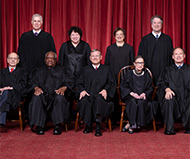Article from: www.thenewspaper.com/news/66/6686.asp
4/2/2019
US Supreme Court Case Could Cripple Photo Enforcement
US Supreme Court agrees to take a case to decide whether the owner of a vehicle can be presumed to be its driver.
 Nearly every red light camera and speed camera program in the country relies on the presumption that the owner of the car was the driver at the time of the alleged offense. On Monday, the US Supreme Court agreed to put that assumption to the test in a case involving a conventional traffic stop that took place in Kansas three years ago.
Nearly every red light camera and speed camera program in the country relies on the presumption that the owner of the car was the driver at the time of the alleged offense. On Monday, the US Supreme Court agreed to put that assumption to the test in a case involving a conventional traffic stop that took place in Kansas three years ago.
The facts of the case are straightforward. Douglas County Sheriff's Deputy Mark Mehrer ran the plate on a 1995 Chevrolet 1500 pickup truck on April 28, 2016. Although the truck was driving in full compliance with the law, the deputy's computer noted that the truck's owner, Charles Glover Jr, had his license revoked. The officer simply assumed Glover would be behind the wheel as he conducted a traffic stop.
The Kansas Supreme Court last year said the stop, and the presumption that the owner is the drier, violated the Fourth Amendment (view ruling). Should the US Supreme Court agree with Kansas, the precedent would overturn the view of twelve state supreme courts and four federal appellate courts. State prosecutors want the Kansas ruling overturned, arguing that it would impose too great a burden on police to require identification of the driver before conducting a stop. They pointed out the federal court with jurisdiction over Kansas accepted the owner-driver presumption.
"Because the Kansas Supreme Court and the Tenth Circuit have decided the question differently, the Fourth Amendment will apply differently to routine investigative stops in Kansas depending on whether the state of Kansas or the United States files the charge," Kansas attorney general Derek Schmidt observed.
Lawyers for the defense countered that a valid traffic stop is supposed to be based on specific and articulable facts. This case, by contrast, contains no specific facts -- just the general fact that Glover was the owner of the truck. Spouses and family members could have been driving the truck, or the it could have been turned over to a carsharing network to make money while the owner was unable to drive. The defense pointed out that 40 percent of license suspensions in Kansas have nothing to do with public safety or driving record.
"Over time, Kansas's preferred rule will sweep in ever more innocent drivers who are increasingly at the mercy of advancing technology," attorney Sarah E. Harrington wrote. "In a world where an officer must run each plate manually, officers would be unlikely to hit upon even a small fraction of the vehicles registered to unlicensed drivers... Greater and greater deployment of automated license-plate readers (ALPRs) changes the calculus dramatically. Given how saturated some cities already are with ALPRs, vehicles owned by unlicensed drivers would be automatically at risk of seizure throughout significant metropolitan areas, including Washington, DC, and Manhattan."
US Supreme Court rulings in the past have had a big impact on the automated ticketing industry. In 2009, the Melendez-Diaz v. Massachusetts decision created legal chaos for red light camera companies as the high court interpreted the Constitution's Confrontation Clause to mean that third parties could not testify about laboratory tests that they did not perform (view decision). After a number of California courts began tossing photo tickets, the state legislature was forced to pass an industry-backed bill amending the state's evidence code to declare red light camera tickets accurate without any authentication needed.
 Nearly every red light camera and speed camera program in the country relies on the presumption that the owner of the car was the driver at the time of the alleged offense. On Monday, the US Supreme Court agreed to put that assumption to the test in a case involving a conventional traffic stop that took place in Kansas three years ago.
Nearly every red light camera and speed camera program in the country relies on the presumption that the owner of the car was the driver at the time of the alleged offense. On Monday, the US Supreme Court agreed to put that assumption to the test in a case involving a conventional traffic stop that took place in Kansas three years ago.